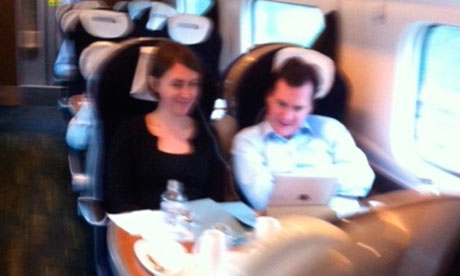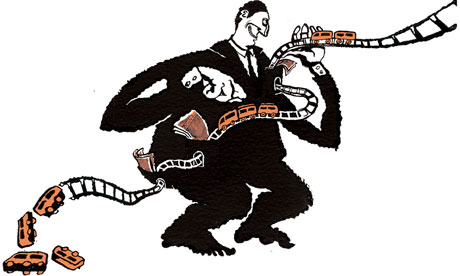The existence of an extraordinary global network of sham company directors, most of them British, can be revealed.
The UK government claims such abuses were stamped out long ago, but a worldwide joint investigation by the Guardian, the BBC's Panorama and the Washington-based International Consortium of Investigative Journalists (ICIJ) has uncovered a booming offshore industry that leaves the way open for both tax avoidance and the concealment of assets.
More than 21,500 companies have been identified using this group of 28 so-called nominee directors. The nominees play a key role in keeping secret hundreds of thousands of commercial transactions. They do so by selling their names for use on official company documents, using addresses in obscure locations all over the world.
This is not illegal under UK law, and sometimes nominee directors have a legitimate role. But our evidence suggests this particular group of directors only pretend to control the companies they put their names to.
The companies themselves are often registered anonymously offshore in the British Virgin Islands (BVI), but also in Ireland, New Zealand, Belize and the UK itself. More than a score of UK agencies sell offshore companies, several of which also help supply sham directors.
One British couple, Sarah and Edward Petre-Mears, who migrated from Sark in the Channel Islands to the Caribbean island of Nevis, have sold their services to more than 2,000 entities, with their names appearing on activities ranging from Russian luxury property purchases to pornography and casino sites.
In 1999, the government claimed Britain's sham director industry had been "effectively outlawed" after a judge, Mr Justice Blackburne, said the court would not tolerate "the situation where someone takes on the directorship of so many companies and then totally abrogates responsibility". But our findings show this has failed to be policed.
These nominee fronts conceal a wide variety of real owners, including those that are perfectly legal, from Russian oligarchs to discreet speculators in the British property market. Their only common factor is the wish for secrecy. Some of the owners we have identified include:
• Vladimir Antonov, the London-based billionaire Russian purchaser of Portsmouth FC, who is currently fighting an extradition request from Lithuania, where he controlled a bank. He denies wrongdoing.
• Yair Spitzer, a north London software engineer who bought and sold London flats. He said: "We were advised by UK accountants that this structure … was perfectly legal."
• The Hackmeys, a wealthy Israeli family, one of whom used a BVI company to buy a £26m London office block. Their spokesman said: "The deal was introduced by a [confidential] joint venture partner who set up the deal and structure."
• Nicholas Joannou, whose Armstrong Group sold shares from an address in Berkeley Square, central London. The Guardian was unable to contact him.
• SP Trading, which was linked in 2009 to a Kazakh businessman and an arms to Iran scandal. The nominee directors in Vanuatu turned out to have no knowledge of the company's true activities. They told us there were "very few cases of misuse by clients".
In a parallel investigation Monday's Panorama on BBC1 is due to show a company formation agent offering to assist its undercover reporter to escape tax. The agent, James Turner, of Turner Little in York, offers nominee directors in Belize and says: "They won't even know that they were a director, they just get paid."
A representative of a second company, Atlas Corporate Services, is asked for maximum confidentiality. He explains that many of its nominees are not even aware of how their names are being used. Jesse Hester, who runs Atlas Corporate Services from Mauritius, is seen assuring a potential client that the UK is unlikely to catch up with him. "Tax authorities don't have the resources to chase everybody down … They reckon it's probably the same rough odds as probably winning the lottery," he says.
The revelations launch a week-long series onthe Guardian site designed to strip away anonymity from offshore companies, the most shadowy aspect of the UK's financial industry. The British Virgin Islands are a particularly successful hideaway, thanks to the exceptional secrecy on offer. This Caribbean territory, which is ultimately controlled by the UK, has sold more than a million anonymously-owned offshore entities since launching itself in 1984 as a tax haven.
The purchasers are often people who, for a variety of reasons, some perfectly legitimate, do not wish to advertise what they are doing with their wealth.
But a worldwide research effort has been launched this year by the ICIJ. It aims to identify, country by country, thousands of the true owners.
The Guardian has collaborated with the ICIJ, a non-profit organisation, to analyse many gigabytes of the British data. This week we intend to reveal the names of more owners. We do not suggest criminal wrongdoing by them. Among those we have contacted, not all go so far as to employ nominee directors. Some insist they have done nothing improper, and are merely taking advantage of legitimate tax breaks or the opportunity for privacy. Critics say, however, that the islands' system can be open to abuse because of its lack of transparency.
Gerard Ryle, the director of the ICIJ, said: "We are applying specialist software to crunch through literally hundreds of thousands of offshore entities to look for patterns. We are marrying our findings with old-fashioned shoe leather and interviews from key insiders who can provide further context on this little known and loosely regulated world. We are satisfied that the information we have is authentic."
Ryle believes the ICIJ's global project, when it is completed next year, will haul into the open a shadowy financial system estimated to conceal the movement around the world of trillions of dollars.
Offshore secrets
Guardian team: David Leigh, Harold Frayman and James Ball.
The project is a collaboration between the Guardian and the International Consortium of Investigative Journalists (ICIJ) headed by Gerard Ryle in Washington DC. Guardian investigations editor David Leigh is a member of ICIJ, a global network of reporters in more than 60 countries who collaborate on in-depth investigative stories that cross national boundaries. The ICIJ was founded in 1997 as a project of the Center for Public Integrity, a Washington DC-based non-profit.


